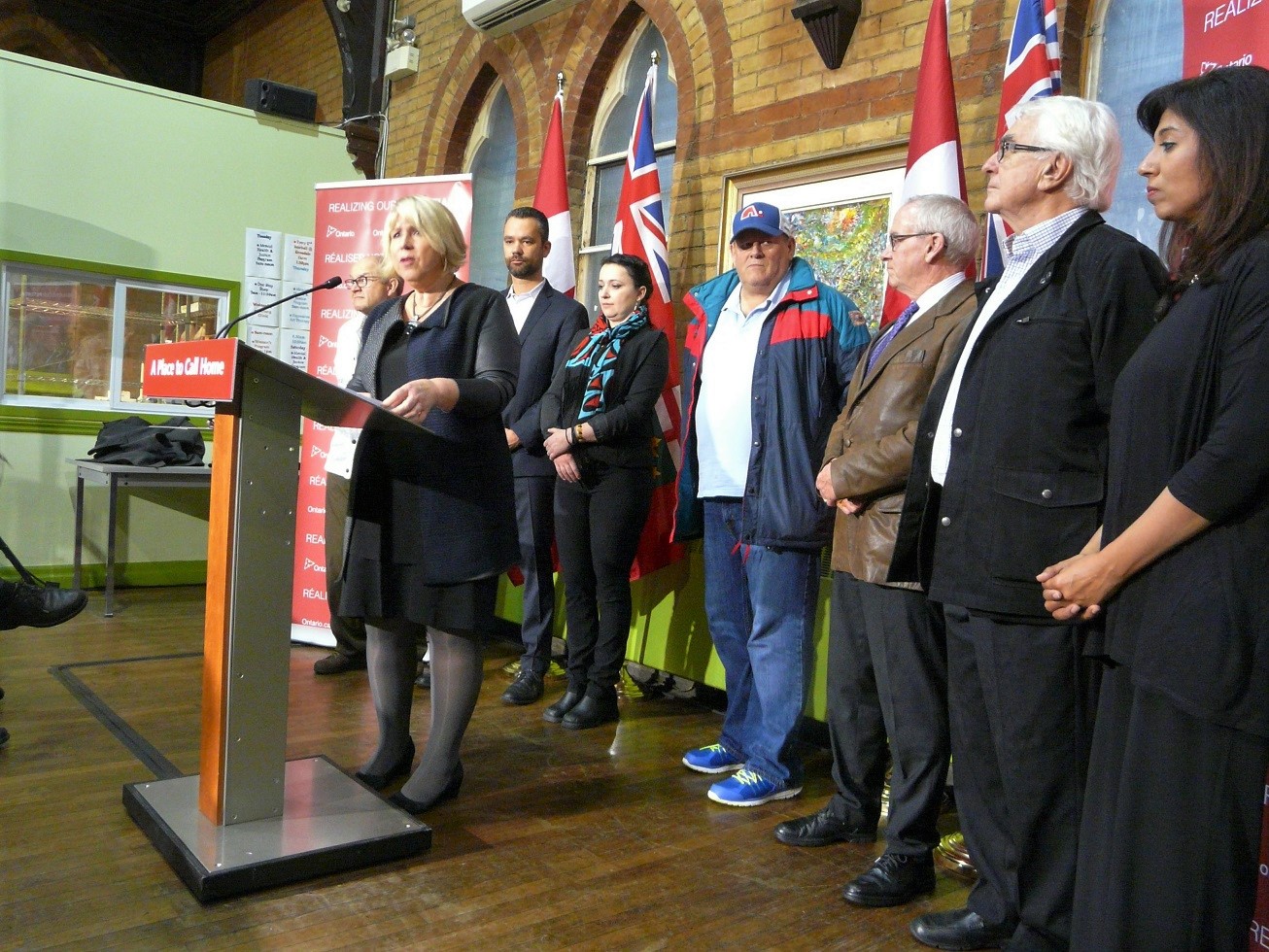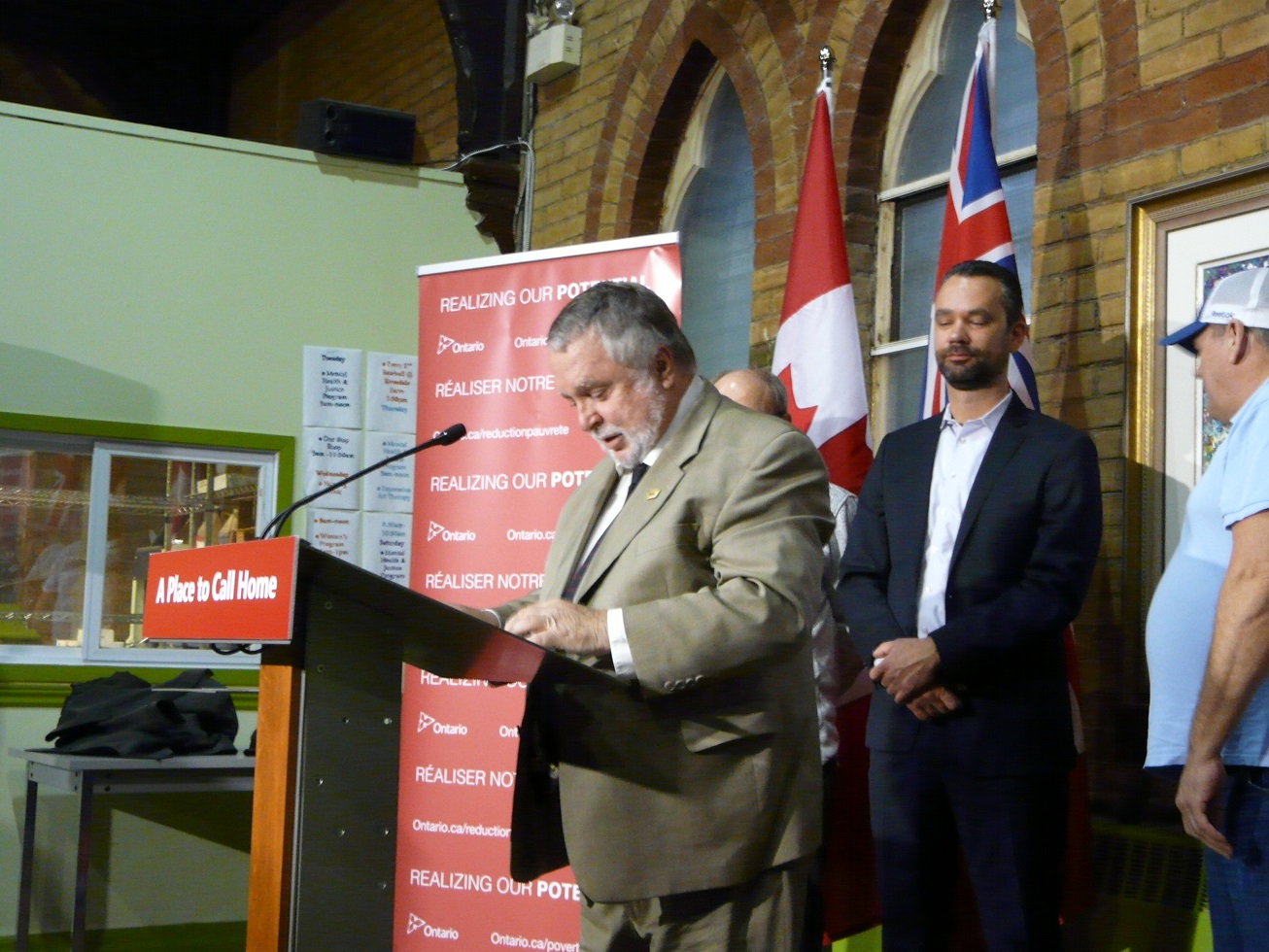On the morning of October 28th, Government Ministers, bureaucrats, press secretaries, and journalists joined member's of Toronto's homeless population in taking shelter from the cold, pouring rain. Gathering under the roof of Margaret's Housing and Community Support Services to await the announcement of a new Provincial Poverty Reduction Strategy initiative, the relief of coming indoors underscored the inhumane circumstances under which some of our society's most vulnerable residents are forced to live. With poverty and homelessness the topics of the day, it was hard not to wonder how many were still outside, and still without shelter from the rain.
Taking the podium, Ontario's Deputy Premier and Minister Responsible for the Poverty Reduction Strategy Deb Matthews stood to address the diverse crowd assembled before her. "We are moving forward with a 10-year commitment to end chronic homelessness," Matthews announced, introducing the Government's ambitious new poverty reduction target, informed by the recommendations from an Expert Advisory Panel on Homelessness.
 Deb Matthews addresses the audience, surrounded by members of the Advisory Panel, image by Stefan Novakovic
Deb Matthews addresses the audience, surrounded by members of the Advisory Panel, image by Stefan Novakovic
With members of the panel standing behind her, the Deputy Premier announced $10 million of Provincial funding to help municipalities combat homelessness over the next decade. Drawing on input from the panel—whose members represent a broad cross-section of backgrounds and first-hand experiences—the Province has adopted a plan that prioritizes eliminating homelessness with action especially prioritized to help the four demographics identified as most vulnerable.
Youth, Aboriginals, the chronically homeless, and those transitioning from provincially-funded institutions (such as jails and hospitals), were identified as the historically neglected groups most acutely in need of increased support. Matthews also announced that a definition of "chronic homelessness" has also been adopted by the Province, as per the panel's recommendation. The designation now officially refers to individuals or families who have been homeless for over 6 months.
"Defining a problem is crucial to understanding it, and eventually solving it" Matthews explained, "and formally defining chronic homelessness allows us to see our shortcomings head-on. It is simply not okay in a province as wealthy as Ontario that thousands of people cannot have something as simple as a home."
In addition, the province announced plans to gather more complete data about homelessness at the municipal level to further fine-tune policy initiatives, while also providing the $10 million in province-wide funding from the Local Poverty Reduction Fund over the next two years.
Matthews also argued that significantly increased funding for poverty reduction is likely to save money in the long-run, citing the substantial decreases in hospitalization and incarceration that typically occur when homeless people are given places to live.
"I remember a constituent of mine called Fred," Matthews told the audience,"who, in the year before he was given a place to live, had to be taken to the ER over 250 times. In other words, two out of every three days he was so sick that he needed to be taken to the hospital. The next year, though, he was given a place to live, and as for his ER visits? Reduced to 2. Ending homelessness is something we can't afford not to do," the Deputy Premier Emphasized, arguing that addressing the root causes of illness and incarceration is much less expensive than treating the recurring symptoms.
 Ted McMeekin addresses the audience, image by Stefan Novakovic
Ted McMeekin addresses the audience, image by Stefan Novakovic
Ted McMeekin, Ontario's Minister of Municipal Affairs and Housing, also spoke at the event (above). Lamenting that homeless people often appear as "nameless and faceless" to the world around them, McMeekin signaled for a paradigm shift in social consciousness, admonishing Ontarians—and their government—to show greater compassion. "Although that should be easier to do now that we finally have an actual Federal partner," McMeekin quipped, drawing applause from the audience.
While the speeches and announcements were received enthusiastically by most members of the crowd, a number of attendees still seemed unconvinced. Some sat unmoving and unmoved as the government's ambitious announcements were met with cheers. Perhaps this should come as no surprise to us, though, given the broken promises and empty words experienced first-hand by many of our city's homeless residents, some of whom have been on the streets for decades, and still remain there.

 1.2K
1.2K 









































